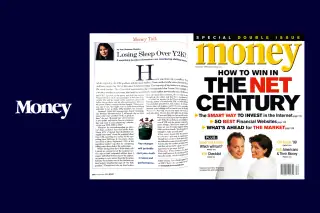Money Classic: How Do You Solve a Problem Like Y2K? (1981)

Money is turning 50! To celebrate, we’ve combed through decades of our print magazines to uncover hidden gems, fascinating stories and vintage personal finance tips that have (surprisingly) withstood the test of time. Throughout 2022, we’ll be sharing our favorite finds in Money Classic, a special limited-edition newsletter that goes out twice a month.
This excerpt, featured in the 12th issue of Money Classic, comes from a story in our September 1999 edition.
Here's one from my e-mailbox: "I want advice regarding the Y2K problem and the stock market. I have worked at the same place for 25 years and have invested in the TIAA/CREF since I started working. The majority of my retirement monies are in the stock market. The TIAA/CREF representative has recommended that I move [that money] into a money-market or real estate fund until we see how the stock market survives the turn of the century and Y2K."
I picked up the phone and dialed the author, Eleanor Bisanzio, an X-ray technologist at Princeton University. She said she wasn't overly concerned about Y2K before she sat down with her plan representative. But over the course of their conversation, that changed. "When someone says to me, 'You might want to think about problems with this,' I start to think, 'Why shouldn't I be worried?'"
Bisanzio's TIAA/CREF representative, Karen Cummings, says Bisanzio misunderstood. "I tell people that we don't know what type of effect [Y2K] is going to have," she says. "If people have a lot of money in the market and they're close to retirement, they may want to start rebalancing—whether it's the year 1990, 2000 or 2010."
Whatever the misunderstanding, an investor's fears escalated. And she's hardly alone. Nearly 40% of mutual fund shareholders are "highly concerned" about the potential fallout from Y2K, according to a survey by the consulting firm DeRemer & Associates. About one-third of those frightened—14% of the population polled—say they are considering selling some shares before the millennium.
What's driving these fears? If the dozen calls I placed are typical, it's not the customer service reps on fund companies' toll-free lines. I suspect individual brokers may be the culprits. According to a new survey from the Securities Industry Association, two of five investors say their brokers broached the topic of "the Y2K problem." Though most also say their brokers then alleviated their concerns, the fact that the brokers brought up the subject may have been worrisome in itself.
So what's an investor to do? Financial planner Harold Evensky, author of a new book, Y2K and Your Money, has a four-step plan grounded in two realities: 1) nobody really knows what will happen, and 2) if you're reasonably well invested, your holdings will be worth more in 10 years.
Step one: Put Y2K out of your mind and focus on your asset allocation. Do you have the right mix of investments? (If you need help, see last month's cover story.)
Step two: Once you have the right mix, consider Y2K. If you feel you are unlikely to panic even if Y2K roils the market temporarily, don't make changes. But if you suspect you'll lose sleep, act now. Evensky suggests shifting 20% from stocks to bonds: "Anything less won't be enough to make you feel good."
Step three: Accept that this move is going to cost you—not only in capital-gains taxes (though you can try to shift assets only in your tax-deferred accounts) but also in performance. Assume that the market probably won't crash and then ask yourself—again—is it worth losing money to get some shut-eye?
Step four: If the answer is yes, decide now when you'll reinvest. If you wait, you're trying to time the market, which is usually a mistake.
Subscribe to Money Classic.